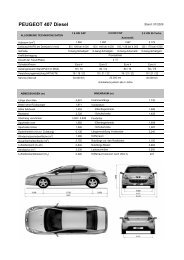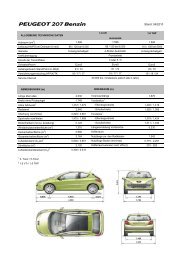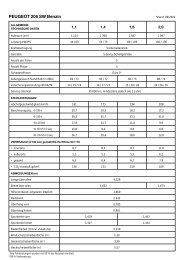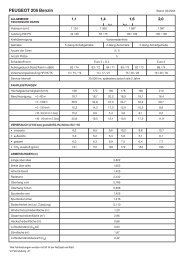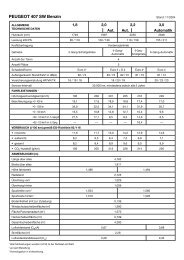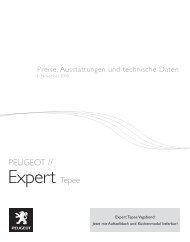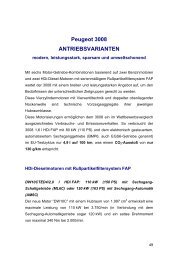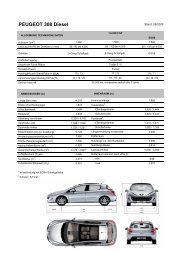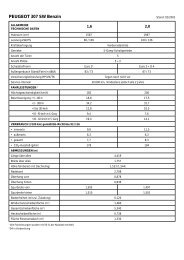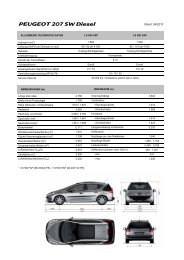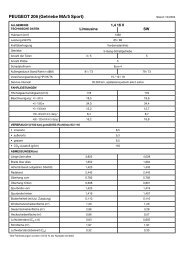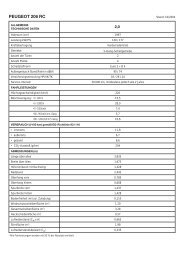PSA COUV page . page RA GB - PEUGEOT Presse
PSA COUV page . page RA GB - PEUGEOT Presse
PSA COUV page . page RA GB - PEUGEOT Presse
Create successful ePaper yourself
Turn your PDF publications into a flip-book with our unique Google optimized e-Paper software.
Growth Strategy<br />
Corporate<br />
Governance<br />
Business Review<br />
Corporate Policies<br />
Management’s<br />
Discussion<br />
and Analysis<br />
Statistics<br />
MORE ENVIRONMENTALLY-<br />
FRIENDLY DIESEL ENGINES<br />
<strong>PSA</strong> Peugeot Citroën’s research is focused<br />
on optimizing emissions at source, i.e.<br />
during combustion, and on developing<br />
aftertreatment systems.<br />
MORE EFFICIENT COMBUSTION<br />
In conventional diesel combustion, the<br />
injected fuel-air mixture is heterogeneous.<br />
This means that some parts of the mixture<br />
are very rich in fuel, which favors the<br />
formation of particulate matter (eliminated<br />
very efficiently by the Group’s exclusive<br />
particle filter) and other parts contain<br />
higher amounts of hot air, which<br />
encourages the formation of nitrogen<br />
oxides. That’s why <strong>PSA</strong> Peugeot Citroën is<br />
investigating Homogeneous Charge<br />
Compression Ignition (HCCI), a form of<br />
combustion that reduces gross emissions<br />
of particulate matter and NOx by 90%.<br />
With injection quality playing such a critical<br />
role, the Group is working with the world’s<br />
leading original equipment manufacturers<br />
to develop very high-pressure direct<br />
injection technology. When combined with<br />
smaller diameter injector holes, this<br />
pressure, which is much higher than<br />
current levels, delivers finer spray, resulting<br />
in more efficient evaporation and<br />
optimized mixture preparation in the<br />
engine cylinder. Injection pressure in the<br />
new HDI 1.6 and 2.0-liter engines has risen<br />
to 1,600 bar from 1,300 bar in firstgeneration<br />
diesels.<br />
T<strong>RA</strong>PPING AND TREATING NOX<br />
While particle filters sharply reduce emissions<br />
of particulate matter, <strong>PSA</strong> Peugeot Citroën<br />
is exploring a number of avenues for<br />
treating nitrogen oxides, including cold<br />
plasma catalysis, DeNOx catalysis, and<br />
selective catalytic reduction.<br />
Unlike conventional catalysis, cold plasma<br />
catalysis offers effective treatment for<br />
exhaust gases at both high and low<br />
temperatures. This is a significant<br />
advantage, since nitrogen oxide emissions<br />
produced during the low-temperature<br />
ignition phase cannot be treated by<br />
<strong>PSA</strong> <strong>PEUGEOT</strong> CITROËN - MANAGING BOARD REPORT 91




